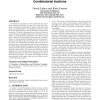Free Online Productivity Tools
i2Speak
i2Symbol
i2OCR
iTex2Img
iWeb2Print
iWeb2Shot
i2Type
iPdf2Split
iPdf2Merge
i2Bopomofo
i2Arabic
i2Style
i2Image
i2PDF
iLatex2Rtf
Sci2ools
154
click to vote
ATAL
2010
Springer
2010
Springer
Parameterizing the winner determination problem for combinatorial auctions
Combinatorial auctions have been studied by the multiagent systems community for some time, since these auctions are an effective mechanism for resource allocation when agents are self-interested. One challenge, however, is that the winner-determination problem (WDP) for combinatorial auctions is NP-hard in the general case. However, there are ways to leverage meaningful structure in the auction so as to achieve a polynomial-time algorithm for the WDP. In this paper, using the formal scope of parameterized complexity theory, we systematically investigate alternative parameterizations of the bids made by the agents (i.e. the input to the WDP for combinatorial auctions) and are able to determine when a parameterization reduces the complexity of the WDP (fixed-parameter tractable), and when a particular parameterization results in the WDP remaining hard (fixedparameter intractable). Our results are relevant to auction designers since they provide information as to what types of bidding-r...
ATAL 2010 | Combinatorial Auctions | Intelligent Agents | Parameterized Complexity | Winner Determination Problem |
Related Content
| Added | 08 Nov 2010 |
| Updated | 08 Nov 2010 |
| Type | Conference |
| Year | 2010 |
| Where | ATAL |
| Authors | David Loker, Kate Larson |
Comments (0)

